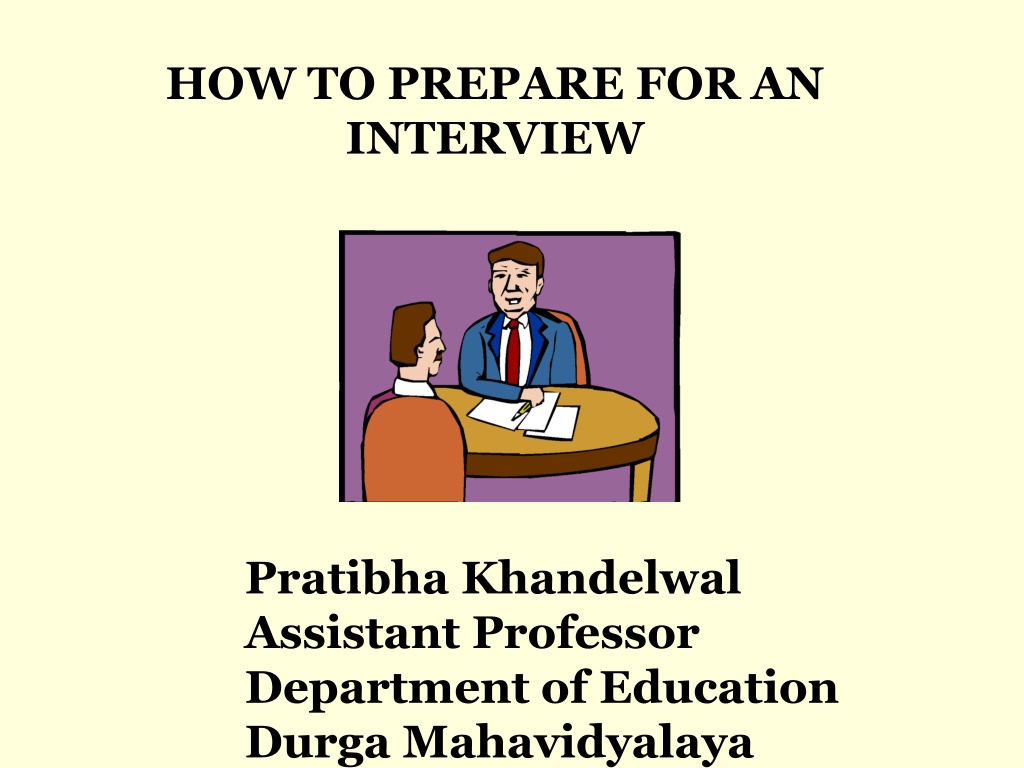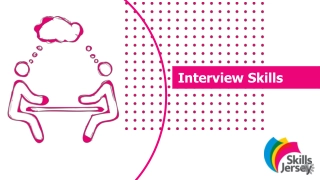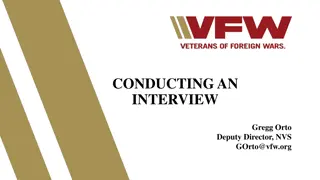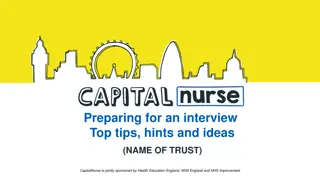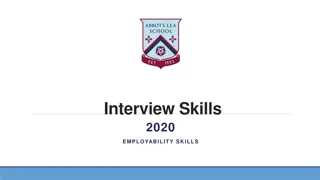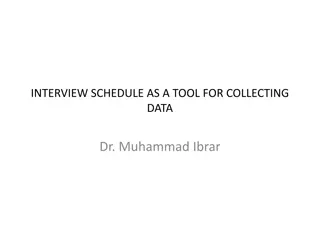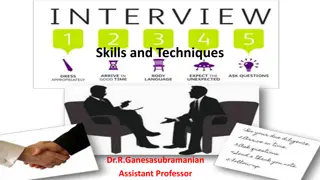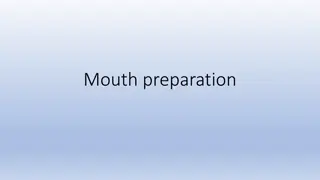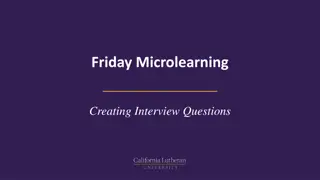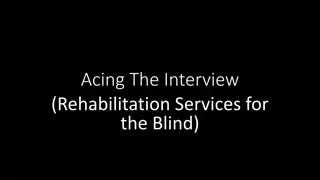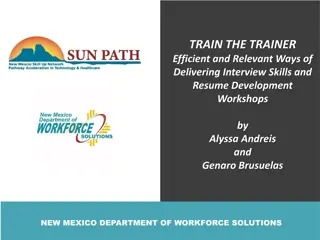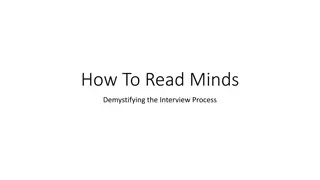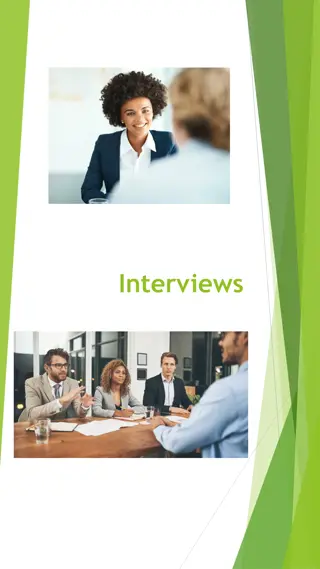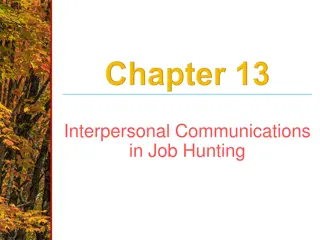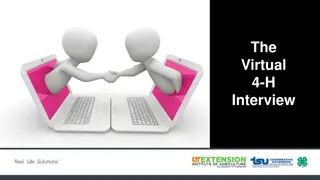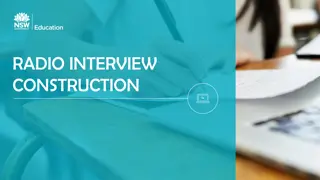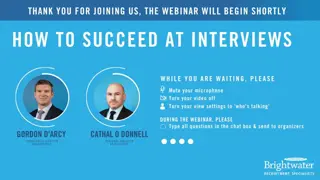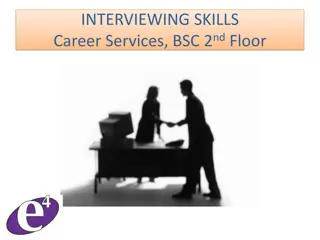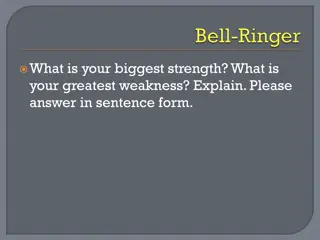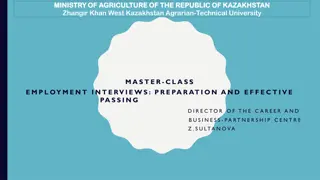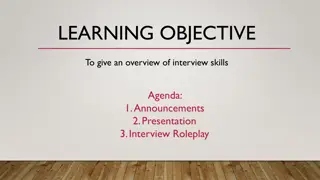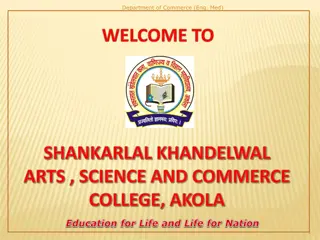Ultimate Guide to Interview Preparation by Pratibha Khandelwal, Assistant Professor
Explore the comprehensive guide on interview preparation by Pratibha Khandelwal, Assistant Professor at Durga Mahavidyalaya. Learn about the meaning of interviews, types of interviews, phases of the interview process, common interview questions, and essential do's and don'ts. Equip yourself with valuable insights to ace your next interview confidently.
Download Presentation

Please find below an Image/Link to download the presentation.
The content on the website is provided AS IS for your information and personal use only. It may not be sold, licensed, or shared on other websites without obtaining consent from the author. Download presentation by click this link. If you encounter any issues during the download, it is possible that the publisher has removed the file from their server.
E N D
Presentation Transcript
HOW TO PREPARE FOR AN INTERVIEW Pratibha Khandelwal Assistant Professor Department of Education Durga Mahavidyalaya
Main Topics Meaning of Interview Types of Interview Phases of Interview Types of questions asked Do s and Don ts of Interview Selection criteria of Interview
Meaning of Interview Word Interview means view between . It is a conversation between minimum 2 persons with a purpose, of getting a view of each other. Be always ready for the interview. Your next boss Be always ready for the interview. Your next boss may be beside you at an unexpected time or place. may be beside you at an unexpected time or place.
Types of Interview(1) On the basis of structure(number of persons involved) 1. Face to face interview 2. Group interview 3. Panel interview On the basis of purpose 1. Selection interview 2. Appraisal interview(performance) 3. Promotional interview 4. Exit interview 5. Reprimand interview(anti disciplinary) 6. Grievance interview
Types of Interview(2) Other types of interview are 1. Informal / formal 2. Role play / reverse role play 3. Telephonic / video / lunch or dinner interviews 4. Stress / assessment instrumental / technical interviews 5. Structural / unstructured interview 6. Theoretical / behavioral interview 7. Combination interview
Phases of Interview Before interview 1. Research about organization(who, size, clients, growth, services ) 2. Personal assessment(SWAN, skills, interest, experience ) 3. Quiz yourself(probable questions, mock interviews ) 4. Be through with your basics 5. Physical preparation(appearance, resume ..) During interview 1. General tips(natural, on time, confident, dress well ) 2. Verbal communication(clarity, concise, brevity .) 3. Body language 4. Effective closing 5. Take notes & Negotiation After interview 1. Collects thoughts immediately 2. Review notes 3. Thanks and follow up 4. References
Type of questions asked Hypothetical questions Probing questions Open ended questions Close ended questions Loaded questions Leading questions Reflective questions On personal details On academic career On curricular activities On co-curricular activities On general knowledge On experience gained Miscellaneous topics
Dos of Interview Be punctual and come prepared Bring extra copies of resume, photos and other documents Be natural and cheerful Be honest, sincere, ethical and gracious Show interest Be always open and positive minded Do stress your achievements Be confident, energetic, calm and poised Keep effective body language Wear conventional, sober and dignified dress Speak clearly, simply, fluently and briefly
Donts of Interview Don t act too smart and don t be too talkative Don t lie and make excuses Don t say negative about others Avoid controversial topics Don t discuss personal issues Don t inquire salary & don t exaggerate present salary Don t fake or overwhelm Don t speak against your last company or boss Don t chew or talk on cell phone
Selection Criteria of Interview Intelligence Appearance and poise Confidence Communication skills Interviewing skills Interest Leadership potential Knowledge Interpersonal relations This emotional experience regardless of outcome is This emotional experience regardless of outcome is only a speed bump in your career process. only a speed bump in your career process.
Questions asked in examination 1. 1. What preparation you will make before appearing What preparation you will make before appearing for a job interview? for a job interview? 2. 2. What traits does an employer look for ,in a What traits does an employer look for ,in a candidate while making interviewing him? candidate while making interviewing him? 3. 3. Writ short notes on Interview . Writ short notes on Interview . 4. 4. How should a candidate conduct himself during How should a candidate conduct himself during selection interviews? selection interviews? 5. 5. What is an interview and how should a candidate What is an interview and how should a candidate prepare for the interviews? prepare for the interviews? 6. 6. Discuss the factors because of which a qualified Discuss the factors because of which a qualified candidate may not be selected for an interview. candidate may not be selected for an interview.
